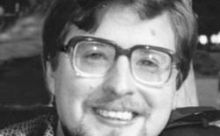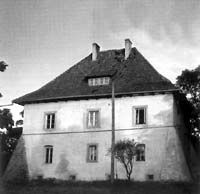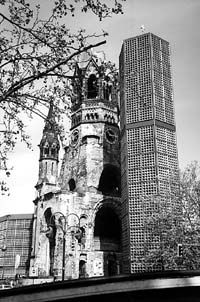STARTING ON A GREAT TREK
I had long wanted to see how people live in the West. Back home everything was perfectly clear and sickeningly familiar, including habitually grim, sulking faces. Maybe people were always smiling there and made enough money not to think of it day and night. A friend of mine said everything was different there after visiting Prague.
Another friend told me in October, “Let’s go to Paris this May. Just imagine, everything will be in blossom and we’ll be in Paris!” I said let’s not make such far-reaching plans (under my breath, I thought later, we might have been discussing a flight to the moon).
“We need to do some saving,” my friend said, “although it will be a journalist trip, cut rate. 330 bucks in all, so start saving now.”
Time passed and I had almost forgotten about that conversation when my friend’s girlfriend asked at me the end of March if I was going to Paris and that they had paid $100 as a collateral and handed in their travel passports for registration.
I found myself longing for Paris. The trouble was that I didn’t have a foreign travel passport. I also learned that a group of journalists would be making the bus trip and that some even knew the language, had made the trip, and were eager to go again. The itinerary was fantastic: Berlin-Paris-Amsterdam-Hague. Well, I told myself, Ukraine is trying to integrate into Europe; it must be time to see who we’re going to integrate with.
Three capitals and the city hosting the International Court, all in ten days. Four days in Paris. The program was just great, except that one had to spend thirty hours in a bus on the way there and thirty hours on the way back. But I hoped I would survive.
Indeed, the bus trip proved anything but easy: the space was cramped and the passengers divided into warring factions, so the time on the road should be described as an expedition rather than a pleasure journey. Rest? Maybe, if you could call that fighting for Lebensraum in a jammed bus. Being a professional reporter, I found the experience rather enriching: the worse the better.
But I am getting ahead of the story. It took me two weeks to get a travel passport. Not the seventh, but surely the second circle of Hell. Yet with Paris ahead, I was prepared for sacrifice.
By the way, the friend that had suggested the trip in May did not go. His girlfriend did. I had to spend the rest of the money after selling my father’s car a long time ago. According to schedule, we would be in Berlin on May 9, Victory Day, which also added to the excitement.
The sightseeing trip, as it turned out, was not a purely journalist affair but organized as part of the Medecins sans Frontieres program. I have had little to do with doctors, except when visiting them in case of necessity – and most of the people I saw at the briefing before the trip were equally remote from the field. In fact, there were a couple of nurses and physicians on a list of forty.
All were attracted by the reasonable cost of the trip: $330. Later it transpired that this did not include the excursions (an average of 7.5 euros each). In terms of food, we did not have to pay for breakfast at a hotel way below one star (shower in the corridor): coffee, rolls, and jam. In the end, each had to part with some six hundred bucks.
To make things even more memorable, I left my new camera at a university canteen in Paris. I returned ten minutes later. Gone, courtesy of black and Arab intellectual patrons (adding another $80 to my traveling expenses, but I referred this to my personal damage costs).
In Paris, as sham physicians, we stumbled into a group of fake Kyiv designers. The latter found the experience more entertaining; while we were herded to lectures on combating drug trafficking, they listened to captivating stories about artistic proportions.
Our group leader, a well-fed man of medium height by the name of Yaroslav (from Western Ukraine) had warned us in Kyiv to say very little about our tour lest some enterprising fellow countrymen meet our bus in Poland and relieve us of all our pocket money. In fact, we had to keep our departure from Kyiv absolutely secret.
Having stuffed my bag with packages of quick-cooking vermicelli and porridge, adding the tied and true immersion heater, I spent a long time pondering which dictionary to take: Russian-French or French-Russian.
If I were to ask questions, I would need the former, but reading signs would require the latter. I took it; it was smaller and weighed less. I agreed with the people I knew in the group that we would each take two bottles of cognac. I also took a bottle of vodka to open in front of the Reichstag, as a symbolic gesture.
I was to bring three souvenirs: a T-shirt from Paris (a friend called at 1:30 a.m., May 7), another friend wanted “just a small stone from Paris,” and a young woman asked for a postcard with a Paris cityscape. Not much.
ON THE TRAIN
The train to Lviv was half empty and the rhythm of the wheels had the effect it always does on the male passengers from my country. More often than not, the first question in a compartment occupied by sworn abstainers is:
“You didn’t take any vodka with you, did you?”
“No.”
“Great, I’m on a diet.”
Ten minutes later, however, a courier is dispatched to the dining car. In our case, with alcoholic drinks abundantly available, there was no need to send anyone anywhere.
After the first couple of rounds, totaling four fingers per capita, everybody was in a lyrical mood. We started making plans for Berlin and finally decided that we would (a) rebuild the Berlin Wall and (b) make May 9 a day long to be remembered afterward.
PASSING MASTER AT CUSTOMS
In Lviv, we boarded a Neoplan bus (of German manufacture). The trademark sounded symbolic [plan, pronounced plahn, is a Russian slang word for a joint of marijuana], considering that we were doctors on our way to combat drug abuse. We thought that New Reefer would be even simpler.
Yaroslav warned that, if asked at customs, we were physicians on a business trip. Eventually, we reached the Polish border. A long line of vehicles were waiting before the square building of the custom house. There were Ukrainian sparrows jumping in the dust on the left side of the checkpoint, with Polish counterparts doing the same on the right side.
We were herded to the turnstile. People were picked at random and led to the glass cubicle with an ever watchful customs inspector inside. He would stare in every face unblinkingly and compare what he saw to the photo in the passport. Most of us had faces that looked considerably worse than our photos. Under the customs officer’s cold stare our faces involuntarily twisted, as though trying to look like the photos. The result was mostly a mournful expression completely different from the photographic image.
Nevertheless, we all passed master and everybody felt elated, almost the way a criminal would, having escaped a police roundup.
Finally, we were on the other side of the checkpoint and a scarecrow in a Ukrainian kitchen garden waved us goodbye. I thought it was a good symbol of our long-suffering homeland: threadbare, with numerous holes, always swaying in the wind, but otherwise looking quite cheerful. Strangely, the sight inspired opti mism.
G OODBYE, UKRAINE!
I was abroad for the first time in my life. I took a good look around. Gardens filled with stones, windmills, a huge yellow field of rape (I mean the plant whose seeds yield rape oil). I knew there was plenty of rape in Europe, but little rye and buckwheat.
We were several miles from the border, yet no signs of homesickness (nor would there be anytime later). Small cars were passing us increasingly often and their size grew smaller as we moved further into Europe. Now they seemed to dart like pigeons in and out between the wheels of the bus. The Americans like everything big; in Europe, it is minimization and everyone chooses everything according to one’s imagined size.
In Poland, I found a rather creative attitude toward religious architecture. Their churches can be triangular and look like entrances to underpasses. The roof might look like a huge white cross and the dome a semitransparent avant-garde design: neat private homes with tile roofing, mostly red.
Every Polish homeowner practices a creative approach toward his patio, building a decorative bridge over the kitchen garden or adding a floral arch. In a word, an aesthetically-minded people.
Our drivers were also Poles, Pan Adam and Pan Zdenek. The former was typically Polish, with an intelligent face and long nose; the latter was an emaciated version of Charles Bronson, half-Korean with a thin mustache. Both were clad in white shirts and sporting ties. Looking very cultured, especially Zdenek- Bronson who would punctually get drunk every night off duty. Obviously our boy.
We saw what we thought was the most original church design in Krakow, shaped like a submarine, but it was defeated a couple of blocks further by another one looking like a ski jump.
The bus stopped in front of a checkpoint with a barrier. There were twelve such checkpoints and beyond them a turnpike.
We smoothly drove into the night. Now the bus looked like a spaceship, all was dark outside the windows, with green and blue lights flashing past, the driver up front looking like an angel amidst the stars in his white shirt.
We drove at a sensible speed, not more than 70 km/h, according to the new traffic rule for buses carrying passengers. Heavy trucks with trailers took turns and time overtaking us.
The first stop was at a filling station complete with round-the-clock stores, a cafe, and a shower room – but not enough room for all of us. One of the stores offered a display of garden statues: tramps, black footmen, sheep, horses, dwarves, and towering over them all a giant Santa Claus looking more like a nightclub bouncer, a huge fist showing from a red sleeve.
Meanwhile, a conflict was brewing inside the bus. The German manufacturer’s idea of seats was more like a beehive. If you wanted to lean back you ended in your travel companion’s lap (not always female). The cramped space was filled with dialogues like:
“I fit in my fifty square centimeters and you don’t.”
“What do you mean fifty? All you’ve got is ten sq. cm. An inch more and you’re in someone else’s territory. In my seat!”
For me the first night was fantastic! The girl sitting ahead, Mariya by name, leaned back her seat far too low. It had been a long time since I had felt so flattened out! I mean we were alone, the two of us, in a jammed bus. We spent that night together – separated by the seat.
Our Neoplan made the next stop at seven in the morning, at a German filling station.









